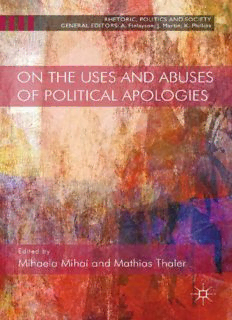Table Of ContentOn the Uses and Abuses of Political Apologies
Rhetoric,PoliticsandSocietySeries
Series Editors: Alan Finlayson, University of East Anglia; James Martin,
Goldsmiths,UniversityofLondon;KendallPhillips,SyracuseUniversity
Rhetoricliesattheintersectionofavarietyofdisciplinaryapproachesandmeth-
ods, drawing upon the study of language, history, culture and philosophy to
understand the persuasive aspects of communication in all its modes: spoken,
written, argued, depicted and performed. This series presents the best interna-
tional research in rhetoric that develops and exemplifies the multifaceted and
cross-disciplinary exploration of practices of persuasion and communication.
It seeks to publish texts that openly explore and expand rhetorical knowledge
and enquiry, be it in the form of historical scholarship, theoretical analysis or
contemporaryculturalandpoliticalcritique.
Titlesinclude:
JudiAtkins,AlanFinlayson,JamesMartinandNickTurnbull(editors)
RHETORICINBRITISHPOLITICSANDSOCIETY
MihaelaMihaiandMathiasThaler(editors)
ONTHEUSESANDABUSESOFPOLITICALAPOLOGIES
Rhetoric,PoliticsandSociety
SeriesStandingOrderISBN978–1–137–33157–1
(outsideNorthAmericaonly)
You can receive future titles in this series as they are published by placing a
standing order. Please contact your bookseller or, in case of difficulty, write to
usattheaddressbelowwithyournameandaddress,thetitleoftheseriesand
theISBNquotedabove.
Customer Services Department, Macmillan Distribution Ltd, Houndmills,
Basingstoke,HampshireRG216XS,England
On the Uses and Abuses
of Political Apologies
Editedby
Mihaela Mihai
DepartmentofPolitics,UniversityofYork,UK
and
Mathias Thaler
DepartmentofPoliticsandInternationalRelations,UniversityofEdinburgh,UK
Selection,introductionandeditorialmatter©MihaelaMihaiandMathias
Thaler2014
Individualchapters©Respectiveauthors2014
Softcover reprint of the hardcover 1st edition 2014 978-1-137-34371-0
Allrightsreserved.Noreproduction,copyortransmissionofthis
publicationmaybemadewithoutwrittenpermission.
Noportionofthispublicationmaybereproduced,copiedortransmitted
savewithwrittenpermissionorinaccordancewiththeprovisionsofthe
Copyright,DesignsandPatentsAct1988,orunderthetermsofanylicence
permittinglimitedcopyingissuedbytheCopyrightLicensingAgency,
SaffronHouse,6–10KirbyStreet,LondonEC1N8TS.
Anypersonwhodoesanyunauthorizedactinrelationtothispublication
maybeliabletocriminalprosecutionandcivilclaimsfordamages.
Theauthorshaveassertedtheirrightstobeidentifiedastheauthorsofthis
workinaccordancewiththeCopyright,DesignsandPatentsAct1988.
Firstpublished2014by
PALGRAVEMACMILLAN
PalgraveMacmillanintheUKisanimprintofMacmillanPublishersLimited,
registeredinEngland,companynumber785998,ofHoundmills,Basingstoke,
HampshireRG216XS.
PalgraveMacmillanintheUSisadivisionofStMartin’sPressLLC,
175FifthAvenue,NewYork,NY10010.
PalgraveMacmillanistheglobalacademicimprintoftheabovecompanies
andhascompaniesandrepresentativesthroughouttheworld.
Palgrave®andMacmillan®areregisteredtrademarksintheUnitedStates,
theUnitedKingdom,Europeandothercountries.
ISBN 978-1-349-46582-8 ISBN 978-1-137-34372-7 (eBook)
DOI 10.1057/9781137343727
Thisbookisprintedonpapersuitableforrecyclingandmadefromfully
managedandsustainedforestsources.Logging,pulpingandmanufacturing
processesareexpectedtoconformtotheenvironmentalregulationsofthe
countryoforigin.
AcataloguerecordforthisbookisavailablefromtheBritishLibrary.
AcatalogrecordforthisbookisavailablefromtheLibraryofCongress.
Contents
ListofIllustrations vii
Acknowledgements viii
NotesonContributors ix
Introduction 1
MihaelaMihaiandMathiasThaler
Part I TheoreticalFoundations
1 BeyondtheIdealPoliticalApology 13
AliceMacLachlan
2 PoliticalApologiesandCategoricalApologies 32
NickSmith
Part II RitesandRitualsof Regret
3 FromMeaCulpatoNostraCulpa:AReparativeApology
fromtheCatholicChurch? 55
DanielleCelermajer
4 ThePowerofRitualCeremoniesinStateApologies:
AnEmpiricalAnalysisoftheBilateralPolish–Russian
CommemorationCeremonyinKatynin2010 76
Michel-AndréHorelt
5 ConfessingtheHolocaust:TheEvolutionofGermanGuilt 96
StefanEngert
Part III ChallengingCases
6 Revisitingthe‘MembershipTheoryofApologies’:Apology
PoliticsinAustraliaandCanada 119
MelissaNobles
7 TheCanadianApologytoIndigenousResidential
SchoolSurvivors:ACaseStudyofRenegotiationof
SocialRelations 138
NeilFunk-Unrau
v
vi Contents
8 WhatMakesaStateApologyAuthoritative?Lessonsfrom
Post-AuthoritarianBrazil 154
NinaSchneider
Part IV ObstaclesandLimitations
9 TheApologyinDemocracies:Reflectionsonthe
ChallengesofCompetingGoods,Citizenship,
NationalismandPluralistPolitics 173
MichaelCunningham
10 AnApologyforPublicApologies? 186
JuanEspindola
11 ReasoningLikeaState:IntegrationandtheLimitsof
OfficialRegret 203
CindyHolder
Bibliography 220
Index 241
Illustrations
5.1 IntheheartofGermany’scapitalinBerlin-Mitte:The
viewoftheReichstagandtheBrandenburgGate,
photographedfromthesiteoftheMemorialofthe
MurderedJewsinEurope(©SE) 110
vii
Acknowledgements
Many debts have been incurred during the process of preparing this
bookforpublication.Wethankourcontributorsforthetimeandeffort
theyputintotheirtexts.OurformercolleaguesattheCentreforSocial
Studies at the University of Coimbra, Portugal, and at the University
of Montreal, Canada, offered helpful comments and generous sugges-
tions.SilviaRodríguezMaeso,AntónioSousaRibeiro,CecíliaMacDowell
SantosandDanielWeinstockprovidedfeedbackontheearliestversion
ofthisproject.
The initial ideas for this book were tested in 2011 at the annual
meeting of the European Consortium for Political Research (Reykjavík
University, Iceland) and at the general conference of the International
PoliticalScienceAssociation(UniversityofSãoPaulo,Brazil).Themajor-
ity of contributors to this volume participated in one or other of these
events.MichaelCunningham,MatthewFestenstein,PaulGready,Audra
Mitchell, John O’Neill, Martin O’Neill, Lynne Tirrell and Lars Waldorf
took part in a workshop dedicated to political apologies at the Univer-
sity of York, UK, in 2013. Their papers helped us reflect on both the
merits and shortcomings of political apologies for historical injustice.
We express our gratitude to Palgrave’s anonymous reviewer, who per-
ceivedthevalueinourproposal.AmberStone-GalileeandAndrewBaird
of Palgrave and Rajeswari Balasubramanian of Integra delivered impor-
tant support during the preparation of the manuscript. Special thanks
areduetoConstantinDavidescuforassemblingtheindexofthisbook.
Our families and friends encouraged us throughout the entire editing
process,andforthiswearegrateful.
Both editors benefitted from generous grants by the Government of
Canada. The InternationalCouncilof Canadian Studies sponsored this
book under the aegis of its Canada–Europe Award scheme. Mihaela
Mihai undertook research for this project while being funded by the
Portuguese Foundation for Science and Technology and the European
Social Fund. In its final stages, the research for this book also received
support from a Marie Curie Career Integration Grant (JUDGEPOL), on
whichMathiasThaleristhePrincipalInvestigator.
MihaelaMihaiandMathiasThaler
YorkandEdinburgh,UK
viii
Contributors
Danielle Celermajer is Associate Professor in the Department of
SociologyandSocialPolicyattheUniversityofSydneyandanexecutive
memberoftheInstituteforDemocracyandHumanRights.SheisDirec-
tor of the University’s Human Rights Programme. Her primary areas of
researcharehumanrightsandpoliticaltheory.SheistheauthorofSins
of the Nation and the Ritual of Apology (2009) and editor of a collection
onHannahArendt,Power,JudgmentandPoliticalEvil,2010.
Michael Cunningham is Senior Lecturer in Politics at the University
of Wolverhampton, UK. His original research interests were in the pol-
itics of Northern Ireland. He is the author of British Government Policy
in Northern Ireland 1969–1989 and of various articles and chapters on
aspectsofNorthernIrishunionistandnationalistpolitics.Sincethelate
1990s, his main research interest has been the politics of apology. He
has published articles and a chapter on the topic. He has recently fin-
ished a book on the politics of apology provisionally titled ‘States of
Apology’.
Stefan Engert currently holds a complementary professorship at the
University of Konstanz, Germany. His research interests include theo-
riesofinternationalrelations,transitionaljustice,andpeaceandconflict
research.
Juan Espindola is a political theorist who recently obtained his PhD
in political science from the University of Michigan. He held a post-
doctoralfellowshipattheUniversityofFrankfurt(CentreforAdvanced
Studies Justitia Amplificata) and is currently a fellow in the Institute for
Social Research at the National University of Mexico. He specialises
in transitional justice issues from a philosophical perspective. He is
completing a book on the moral and political dilemmas of the public
exposureofStasicollaboratorsinGermany,andhasstartedaprojecton
thevictimsoftheso-calledwarondrugsinMexico.
NeilFunk-UnrauisAssociateProfessorofConflictResolutionStudiesat
MennoSimonsCollege,acollegewhichisapartofCanadianMennonite
ix

